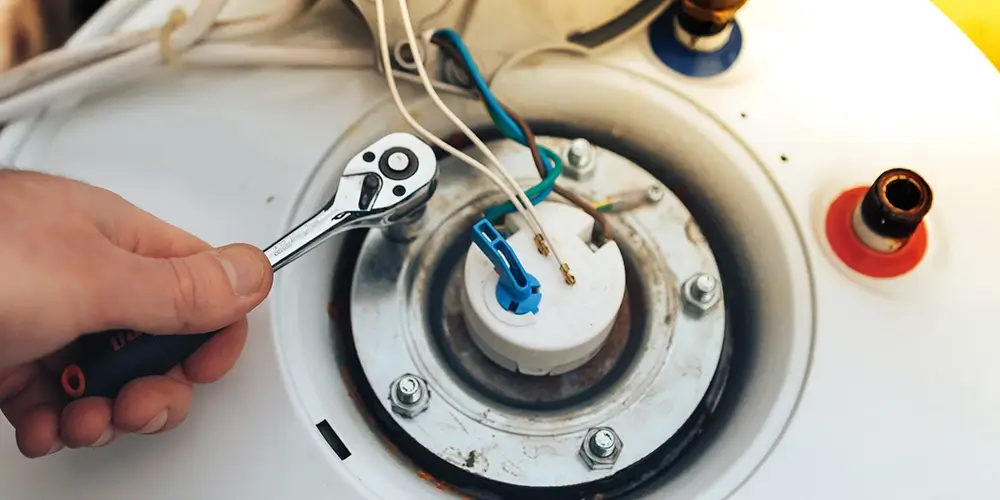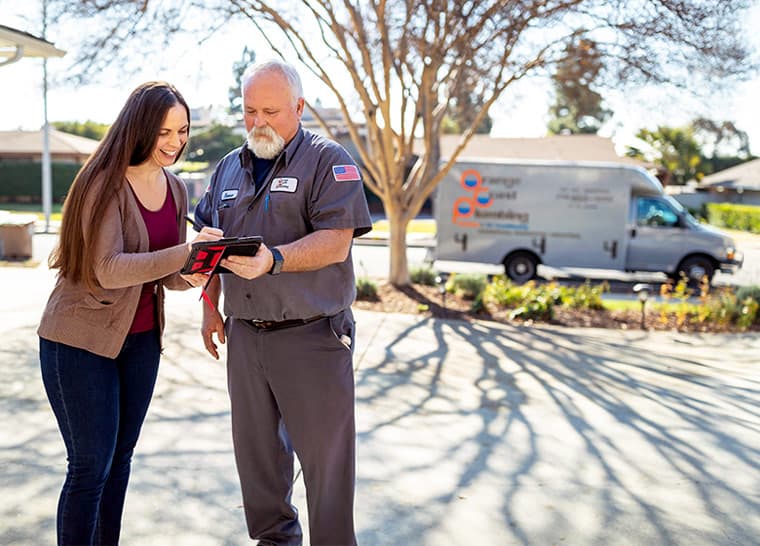Have you noticed a puddle near your water heater? That’s never a good thing.
Most water heaters last about 10 to 15 years, even with proper maintenance. And Orange County’s hard water can shorten the life of any appliance exposed to it.
But before you start shopping around for a new heater or even call the plumber, do a bit of DIY troubleshooting. Can you pinpoint the source of the leak?
As odd as it sounds, if the leak comes from the top, you’re in luck.
Leaks from the bottom may indicate tank corrosion. Game over; call the plumber to install a new heater.
But most water heater leaks at the top are relatively easy to fix; repairs won’t cost an arm and a leg.
Why Your Water Heater Leaks from the Top
To pinpoint the leak, wipe down the top of your water heater with a rag or paper towel. But be careful! Water may be hot enough to burn.
Now you can monitor your water heater to locate the leak’s source. Most leaks will come from a faulty pressure relief valve, loose pipe fitting, or corroded anode rod.
1. Leaking Pressure Relief Valve
As the name suggests, the pressure relief valve is a safety feature to prevent your water heater from bursting.
It operates almost like the pressure relief valve of a pressure cooker, keeping internal pressure within a safe operating range.
It’s usually mounted on top, although some water heater models have side-mounted valves.
The relief valve should release steam occasionally, but it shouldn’t leak. So to determine if the valve is, in fact, defective:
- Open and close the valve several times to see if the leak stops.
- Wait a day or two; if the leak continues, you’ll need to replace the valve.
- Unless you’re very handy with DIY repairs and appliances, call a licensed plumber or appliance repair technician. Your insurance may not cover an explosion due to a DIY valve job.
Note: Water leaking from the piping attached to the release valve may indicate an overheated tank.
Also, if your water is boiling, but the temperature settings seem normal, you may have a malfunctioning thermostat or another problem.
Call a plumber for a professional diagnosis.
2. Leaking Cold Water Inlet Valve or Hot Water Valve
The valve, the valves…
Yes, there are more of them, and they also could be leaking.
Cold water inlet and hot water outlet pipes sit above your water heater. Both have control valves, and if these valves are loose, you’ll need to tighten the fittings. Defective valves must be replaced.
3. Loose Pipe Fittings & Leaky Pipes
You’ve just dealt with the fittings for the valves. Good work!
But the pipes may need replacement, not just valves and valve fittings.
If fittings are loose, tighten them. Teflon tape can improve the seal.
If pipes are corroded, have a certified plumber replace them. You may be able to plug leaks temporarily with Teflon tape, but that’s as far as it should go with DIY pipe repairs.
How do you know if a pipe is corroded? You can ask a plumber for an assessment, but the telltale signs are rust or a powdery white coating on the surface of the pipe.
4. Corroded Anode Rod
An anode rod attracts corrosive elements to itself to prevent corrosion in the water heater tank, earning it the name of “sacrificial anode.” It takes a hit for the team.
All water heaters have at least one anode rod; some have two.
These manganese, aluminum, and zinc rods rods slowly deteriorate, and when an anode rod corrodes completely, it can no longer do its job.
Then the inner lining of your water tank starts to corrode because it no longer has the anode rod to protect it.
Water bubbling up around the area where the anode rod enters the tank is a sure sign of corrosion.
Call a plumber immediately if you detect this leak. Your entire tank should be checked for corrosion because you can’t know how long the anode has been out of commission.
An Ounce of Prevention Is Worth a Pound of Repair
A routine annual check can prevent most problems with a water heater. The plumber will check all connections and valves, flush sediment out of the tank, and evaluate the condition of your heater.
But even in the best circumstances, no water heater lasts forever. Hard water, corroded pipes, and a lack of maintenance will shorten its life.
Call us if you suspect your water heater needs a plumbing friend. We’ll give you an honest assessment, inform you of your options, and complete the repair or replacement at a competitive price.
FAQs: Water Leaks from the Top of Your Heater
Q: Why is water leaking from the top of my water heater?
Leaks at the top of a water heater are commonly due to loose piping connections, faulty valves, or a corroded tank top. The first two problems can be repaired; the latter usually requires a replacement water heater.
Q: Can I fix a loose pipe myself?
If you’re comfortable with plumbing, try tightening the connection with a wrench. However, we recommend a professional inspection to ensure the repair is done correctly and prevent damage.
Q: How do I know if my valve is faulty?
A faulty valve will have a visible leak or constantly release water. You can tighten the valve, but it may need to be replaced if that doesn’t stop the leak.
Q: What causes a corroded tank top?
This is often caused by age and the buildup of sediment and minerals inside the tank, weakening the metal and promoting rust.
Q: Is a water leak from the top of the water heater dangerous?
While not immediately dangerous, it can lead to property damage, mold growth, or water heater malfunction.
Q: How can I prevent leaks from occurring in the future?
Regular maintenance, such as flushing your water heater to remove sediment buildup, can prolong its lifespan and help prevent leaks. Address any plumbing issues promptly to avoid strain on the water heater.
Q: How can I detect a water leak from the top of my water heater?
A: Check for moisture or water pooling around the inlet and outlet connections, and visible rust or corrosion on the top of the water heater. Dampness or a consistent dripping sound can also indicate a leak.
Q: Can I fix a leaky water heater by myself?
A: Minor leaks involving loose connections can often be fixed DIY. However, a professional plumber should handle more complex problems.
Q: How do I tighten a loose fitting to stop a leak?
A: First, turn off the water supply. Then, use a wrench to gently tighten the loose fitting. Be careful not to overtighten and cause further damage.
Q: What should I do if the leak persists after tightening the connections?
At this point, we advise contacting a professional plumber.
Q: What’s the role of the temperature and pressure relief valve in leaks?
The temperature and pressure relief (T&P) valve releases water if the pressure or temperature exceeds safe levels. Leaks from the T&P valve may also suggest an issue with excessive pressure or temperature.
Q: Can a water leak from the heater top affect my water quality?
A: Though rare, if the tank is corroding, it could compromise the water quality. If you notice discoloration or an unusual taste, call a professional.


